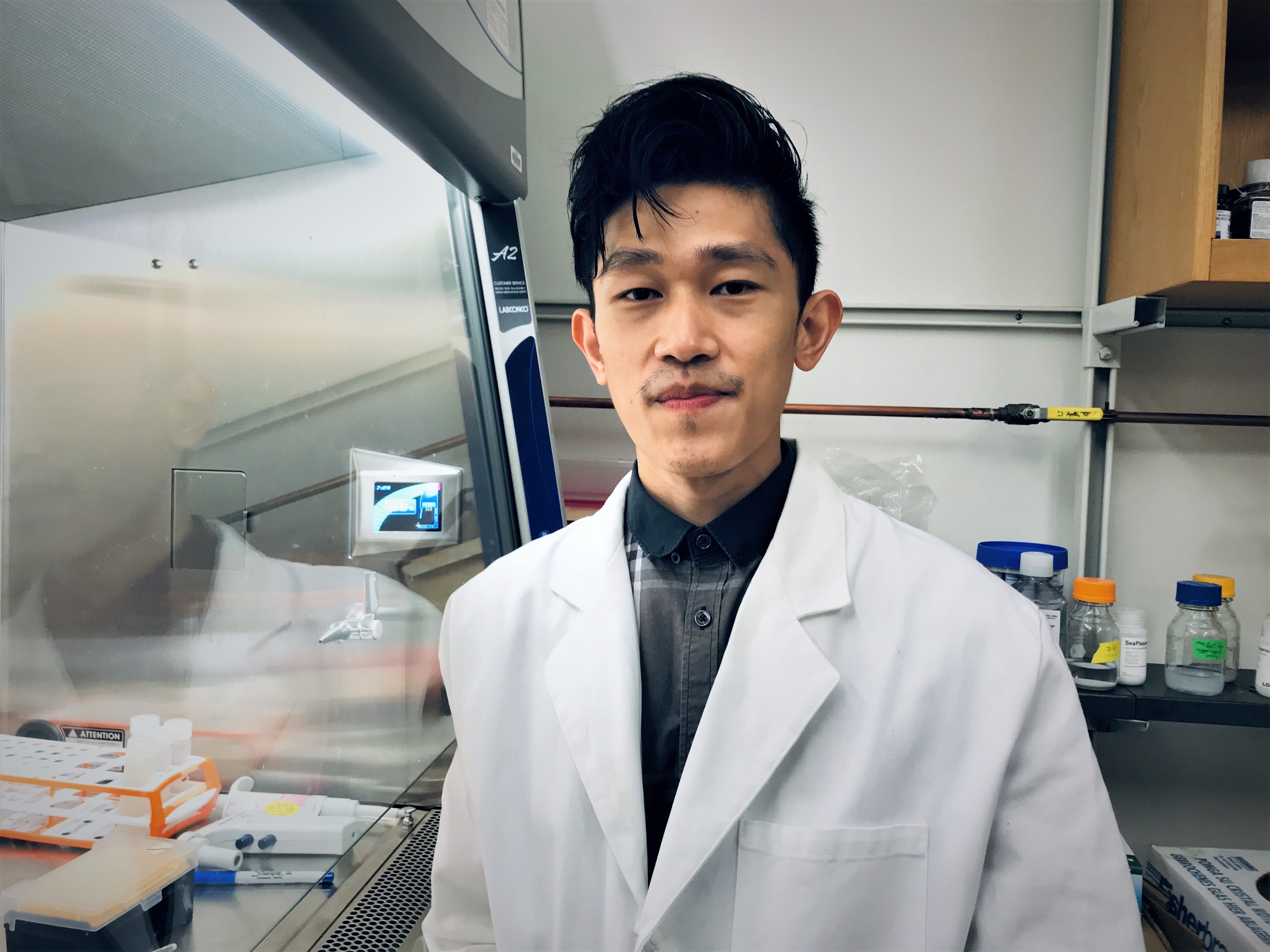A Covid-19 researcher, teacher and caregiver gives back
Queensborough alumnus and immigrant Kaung Myat San is tackling the virus, first-hand, in Queens
Quarantined at home in Elmhurst, ground zero during the spring for New York’s pandemic, Covid-19 researcher Kaung Myat San applied cold compresses and administered tea, vitamins and over-the-counter fever reducers to his father, wracked with pain and severely weakened by the virus, hoping to stave off a hospital admission.
“I slept beside him and stayed with him all day, made sure nothing bad happened and took care of whatever he needed,” said San, known to his friends as Zach.
“My whole family got it, too, and I had a bad fever,” he added.

Kaung Myat San helped his father manage Covid-19; now he’s helping all of New York City.
Inches from his father’s bedside, between doses, Zach, also an Adjunct Lecturer, conducted microbiology lessons from a makeshift nightstand lectern via Zoom to hundreds of online students at LaGuardia Community and Queens Colleges.
“Teaching is a way for me to give back to CUNY, which has given me so much. I know what my students are going through. I know where they’re coming from,” said the Queensborough Community College and Queens College graduate, who holds an Associate’s Degree in Biotechnology from QCC, as well as a Bachelor’s in Biology and a Master’s in Urban Biology from Queens.
After he and his family fully recovered, Zach decamped and hunkered down at the biology labs in Kew Gardens, where he and research colleagues pored over – and continue to pore over – hundreds of samples of New York City wastewater, looking for evidence of the epidemic’s density and deadly reach.
“As a Research Assistant I can fight this disease and give back to my community. I do what is known as wet lab work, the hands-on processing of the specimens,” Zach explained.
Since May, he has been part of a team of investigators, including Queensborough’s Dr. Monica Trujillo and Queens College’s Dr. John Dennehy, studying Covid-19 in local and Westchester effluents. The project, vital to the New York area’s health and well-being, will continue through to 2021.
[See corresponding article: Finding Covid-19 in the Water]
“After the sewage is heated to 60 degrees Celsius and becomes safe and inactive, I centrifuge it to separate the particles, and then filter the fluid before we can identify and extract the virus. After that, we open up its cells and extract the RNA – Covid’s genetic material,” he detailed, emphasizing that it can take up to a week to isolate sufficient data to work with.
“When we started, we found a lot of Covid-19 in the water and saw it decrease into June through to July and August. Recently, however, we have seen a little increase,” he said.
It is a relentless research and teaching schedule for this first-generation college graduate and immigrant from Burma (Myanmar), who became accustomed to long hours and hard work upon his arrival to the USA 13 years ago (with his older sister) as a high school student.
“It was difficult at the start. We had limited resources and our English language skills were not very good. There was no big Burmese community for us, either, in Queens,” Zach recounted.
Toward the end of high school, Zach took a part-time position at KFC to save for college and help cover some immediate expenses. He and his sister, who is currently finishing a PhD in Chemistry at the CUNY Graduate Center, decided to enroll in Queensborough because it was close to home and they could easily schedule classes around their hospitality jobs.
“My plan was to earn my associate’s degree, transfer to a senior college and pursue a career in science and medicine. I got a head start when I was able to participate in undergrad chemistry and biology research during my first year at Queensborough,” he said, grateful for the support of his professors, advisers and family.
“I appreciate everything my parents did for us, including my two younger brothers (who are also CUNY educated, in Accounting and Criminal Justice). My father and mother were not able to finish high school in Burma, but here, their children are well advanced in their education,” Zach added.
Lab hours often extend into the evening. When he can steal away some time, Zach prepares for the MCAT, the Medical College Admission Test.
“Queensborough, especially, made everything possible for me. It gave me the strong foundation and skills that I use every day to work, learn and pursue my medical degree.”
###
Contact:
Michael Donahue or Alice Doyle



